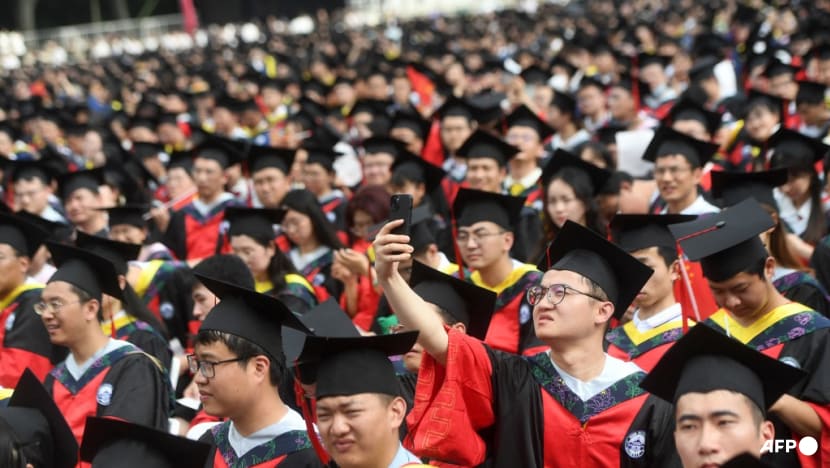Chinese universities clamp down on AI-generated content, as record graduation season starts
More than 80 per cent of college students have used artificial intelligence tools in their assignments, according to a survey that had 7,000-plus respondents.

Graduates of Wuhan University attend the graduation ceremony in Wuhan, in China's central Hubei province on Jun 20, 2023. (Photo: AFP/STR)

This audio is generated by an AI tool.
SINGAPORE: A growing number of universities in China have issued rules on the use of artificial intelligence (AI) in students’ work as the college graduation season gets into full swing.
A record 11.7 million college students are set to graduate during this period, which lasts from around late May to July.
The moves come amid institutions’ concerns over academic integrity and as a recent survey points to the widespread use of AI tools among college students.
Fuzhou University in April announced that all undergraduate theses for students graduating this year will be subject to checks for AI-generated content before the final draft and after the paper is reviewed.
The decision to roll out the trial detection system is to “further strengthen academic ethics and academic integrity education”, the university said in a statement posted on its website on Apr 28.
It added that the results of the check will be “used as a reference” when evaluating the students’ theses, and when selecting “outstanding undergraduate theses”.
That same month, Tianjin University of Science and Technology announced that undergraduate theses would be checked for AI-generated content. If the proportion exceeds 40 per cent, the student must make revisions, Chinese news site China Daily reported.
Hubei University has also announced similar measures, The Paper reported. If it is found that the student’s thesis has a “high risk of AI-generated content”, teachers should tell the student to make revisions, the institution noted.
Polls suggest the use of AI tools is common among Chinese university students. A November 2023 survey by state youth newspaper China Youth Daily showed that nearly 85 per cent of the 7,000-plus respondents have used AI tools.
Mr Zhang Hang, a student from Jinan University told the newspaper that he had used an AI tool to summarise an English text to Chinese.
He said he had used translation software to “speed up” his readings in English, but found that the translations provided did not “flow smoothly”, China Youth Daily reported.
As more universities take steps to weed out AI-generated content, some students are even resorting to AI tools to ensure their writing clears the checks, according to a report by Sixth Tone.
The online news site also reported that on lifestyle app Xiaohongshu, there were more than 10,000 posts sharing tips on reducing “AI detection rates”.
There were also services to lower AI detection rates on e-commerce platforms such as Taobao.
In August last year, state broadcaster CCTV reported that a draft law on academic degrees submitted to the Standing Committee of the National People's Congress included a ban on using AI to write dissertations.
The law, which was adopted on Apr 26, did not include mention of a ban on using AI to write dissertations.
Under it, an academic degree will be withheld or revoked if the recipient’s dissertation involves academic misconduct such as ghostwriting, plagiarism or falsification.
The law will take effect from Jan 1, 2025, according to state news agency Xinhua.















